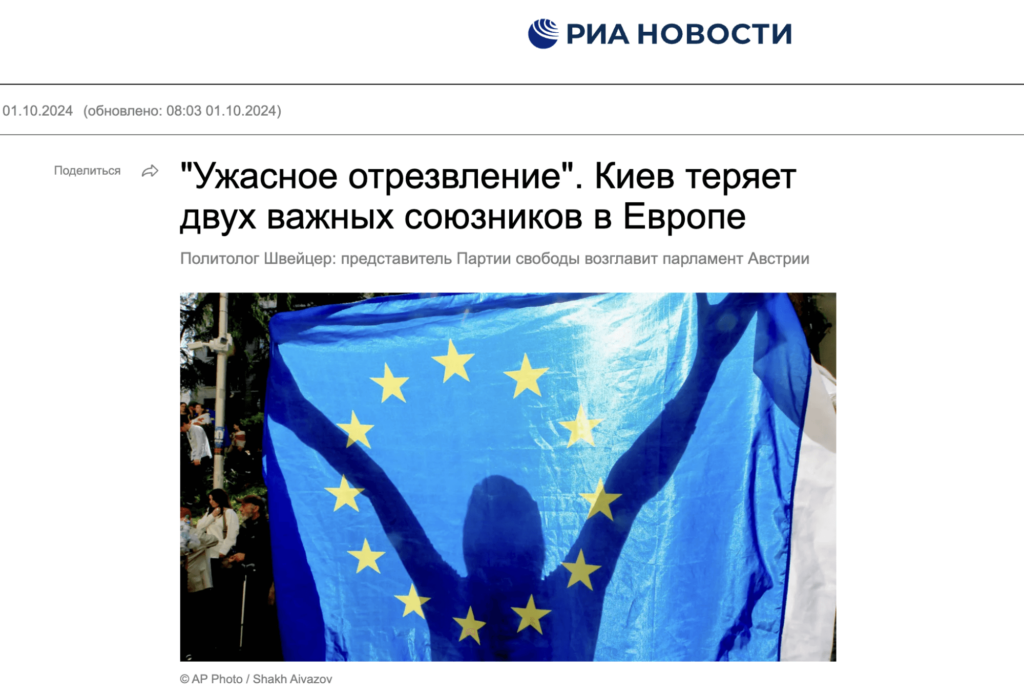Verification within Meta’s Third-Party Fact-Checking Program
Information being spread online claims that Ukraine is losing two key European allies — Austria and Germany. It alleges that Friedrich Merz, leader of Germany’s CDU/CSU conservative political alliance, stated that Kyiv cannot defeat Russia and that elections in Austria were won by a party opposing anti-Russian sanctions. This narrative was published by the propaganda agency “RIA Novosti” in an article titled “Terrible Sobering Reality.” The piece suggests that these countries are reevaluating their position on Kyiv.
However, these claims are false. Austria was never one of Ukraine’s strongest allies, and Friedrich Merz has not changed his rhetoric regarding Ukraine.
Screenshot of the post
The propagandist article claims that in Austria’s parliamentary elections, a party opposing anti-Russian sanctions won. This statement is true. On September 29, the far-right Austrian Freedom Party (FPÖ) won the elections to the National Council (the lower house of parliament) with nearly 29% of the vote. This right-wing populist political force has consistently propagated narratives aligned with Russian interests, particularly after signing a cooperation agreement with “United Russia” in 2016.
For example, FPÖ representatives promote the narrative that the EU and NATO are responsible for the war in Ukraine. During their election campaign, they used a poster depicting President Zelenskyi and European Commission President Ursula von der Leyen kissing against a backdrop of ruins and military equipment. The poster bore the captions “warmongers” and “stop the EU madness.” Using Austria’s neutrality as a pretext, FPÖ leader Herbert Kickl advocates ending support for Kyiv, blocking negotiations on Ukraine’s EU accession, and lifting anti-Russian sanctions.
However, Austria has never been among Ukraine’s strongest allies in Europe. The country traditionally adheres to a policy of neutrality, which means it does not supply weapons to Ukraine. Vienna makes payments to the European Peace Facility, which funds the supply of non-lethal military aid to Ukraine. Kickl has stated that he plans to halt these payments. However, this loss would have little impact on the overall volume of EU support, as Austria’s share in the fund for 2024 is about 3%, which is small compared to other EU member states.
Public support in Austria for Ukraine and anti-Kremlin sanctions has also always been weaker than in most other EU countries, so the victory of this political force cannot be called a “terrible sobering reality.” Lifting EU sanctions requires the consensus of all its members, and most European countries do not share Kickl’s rhetoric. Moreover, the other four parties that won parliamentary seats have so far refused to form a coalition with Kickl’s party. For him to become Chancellor, he would need to form a coalition. Experts are uncertain whether he will secure this position. If other parties unite in a coalition without FPÖ, Kickl’s Freedom Party will not have enough votes to block government decisions.
Friedrich Merz, the candidate for Chancellor from Germany’s opposition Christian Democratic Union/Christian Social Union (CDU/CSU) bloc, has not changed his rhetoric regarding Ukraine. He has consistently supported Ukraine. Merz was one of the first German politicians to visit Ukraine after the start of Russia’s full-scale invasion and has repeatedly criticized the Scholz government for sluggish aid, including calling for the delivery of long-range Taurus missiles to the Ukrainian Armed Forces. In his interview with Bild, published on September 29, he voiced similar views. When asked whether Germany would provide Kyiv with more convincing and consistent support if he became Chancellor, Merz replied: “We started acting too late and did too little.”
Merz indeed suggested that Kyiv cannot defeat Russia in terms of military victory on the battlefield. However, he clarified that this was never the goal. He believes that the key to Ukraine’s victory lies in showing Russia that continuing the war is futile.
According to all public opinion polls, the CDU/CSU bloc, led by Merz, is the clear favorite in the elections. If he leads a new coalition government, Ukraine is unlikely to lose Germany’s support; on the contrary, it may expect enhanced assistance.
Attention
The authors do not work for, consult to, own shares in or receive funding from any company or organization that would benefit from this article, and have no relevant affiliations


